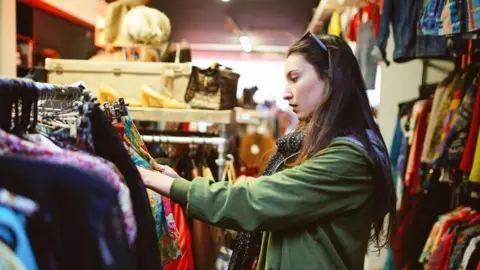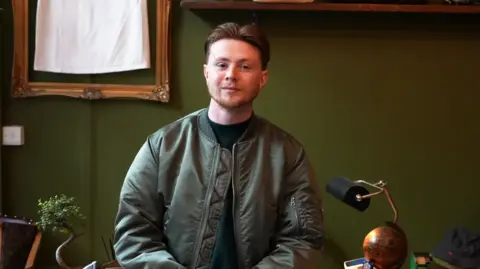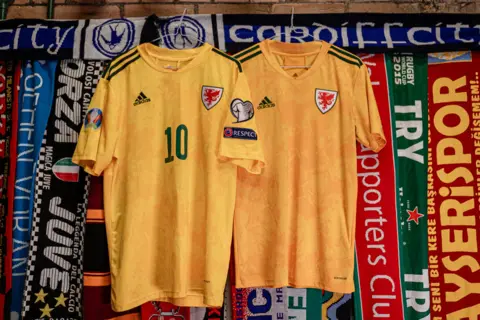Criminals selling fake vintage fashion online
 Getty Images
Getty ImagesWhen influencer Torbian Dennis bought a £150 pair of trainers on a popular online marketplace, he was told by the seller they were genuine.
But when he got them through the post he wasn't sure and checked them on a specialist app - only to discover they were knock-offs.
The pre-loved clothing market is booming and is expected to be worth almost £300bn by 2029, as people shop sustainably or search for bargains in the Cost of Living crisis.
But bargain-hunters are now being warned that criminals could be profiting by selling fake versions of designer clothes, handbags, shoes and even football shirts for prices that suggest they are real.
"The sellers assured me they were authentic," said Torbian, a 23-year-old fashion influencer from Cardiff who uses online second-hand platforms to find bargain brands.
"I've been caught out multiple times when buying Nike trainers online."
Torbian was able to get a refund because he paid using PayPal.
He thinks some sellers believe they are marketing the real deal - but not everyone is genuine.

People buying second-hand fashion have been urged to be aware of counterfeit pre-loved goods on sites such as eBay, Vinted, Depop and Facebook Marketplace as well as in high street vintage shops.
"The second hand market has become really popular and criminals will use that as an opportunity," said Helen Barnham of the Intellectual Property Office (IPO).
The IPO has started looking into whether "criminals are to trying infiltrate supply chains" and is also concerned some fake goods could be "unsafe or dangerous".
"People are really interested in a bargain or finding a bespoke piece so we're researching whether people are coming across counterfeits or fake goods," she said.
"Consumers could be getting ripped off for something they think is genuine but find out it's actually fake and could cause them harm."
Figures from Citizen's Advice show a 30% rise in complaints about counterfeit goods being sold online in the last year and people or businesses caught selling fakes can face unlimited fines or sentences of up to 10 years.
Second-hand shop owner Jacob Knight says he has noticed a rise in counterfeit goods and feels it should be up to sellers to ensure what they sell is genuine.
"You've got to do your research and really study and master the craft of telling which is which, as it's such a big problem now," said Jacob, who runs Knight Vintage in Cardiff.
He said some of the brands most commonly faked are Stone Island, Louis Vuitton, Gucci and Prada.
The 26-year-old from Cardiff only buys from certain trusted collectors.
"Unfortunately, when someone gets burnt once they're always going to have that same feeling towards other products and are always going to be that extra bit cautious about buying designer products," he said.
Jacob worries that with a rise in counterfeits, shoppers might lose faith in vintage shops.
"The businesses will suffer and you won't see them on the high street anymore," added Ms Barnham of the IPO.

It is also a concern for online marketplaces, many of which are increasingly promoting themselves as destinations for luxury shopping.
In March, Vinted launched its own collection, House of Vinted, promoting second-hand bags, shoes and clothes from brands like Prada, Gucci and Jimmy Choo, some setting customers back thousands of pounds.
The platform, eBay and others have now launched authentication services for high end and expensive goods.
An eBay boss told the BBC they have authenticated 10 million luxury items so buyers can "be confident" they're not getting a fake.
How can I protect myself from being sold fakes?
- Use trusted sellers
- Check logos and trademarks are correct
- Check the refund policy
- Pay with credit card or PayPal
- Remember, if it's too good to be true, it often is
Kirsty Keoghan, eBay's global general manager of fashion, said the market for designer second-hand fashion from brands such as Nike Air Jordan trainers, Rolex watches and Hermes Kelly handbags is "growing exponentially".
"When things are on trend, or there's a rise in demand unfortunately there will be fraudsters out there who will be trying to create inauthentic items," she said.
"We do a lot in the background to make sure those listings don't end up on eBay."
It's not just designer handbags and trainers in demand but the retro sports kits market is booming too.
Daniel Rees buys and sells items including American Football, basketball, rugby and football shirts.
"If you go to say a Wales football game, you'll see hundreds of 1994 shirts and 95% of those are going to be fake," said Wales footy fan Daniel, who runs of Cardiff Classic Shirts.
He said while some are clearly counterfeit, others are being sold online are "marketed at the prices they would be if they were genuine".

Daniel uses product codes, his knowledge of where legitimate shirts are made and what tags should look like to spot the real items.
Online marketplaces are not always legally responsible for fake goods sold on their platforms but the Chartered Trading Standards Institute (CTSI) wants that to change as it has "serious concerns" about unsafe or counterfeit goods.
It is calling for online marketplaces to be made responsible for all products sold on their platforms and wants amendments to the Product Regulation and Metrology Bill, which is currently making its way through Parliament, to "make companies responsible if unsafe counterfeit goods are sold on their sites".
"The CTSI has serious concerns relating to the flood of unsafe or counterfeit products being sold by third parties on online marketplaces in recent years," said David MacKenzie of the CTSI.
Vinted, Depop and eBay have said they would suspend or ban users if they're caught selling counterfeit goods.
Meta, which owns Facebook Marketplace, said it works closely with law enforcement to support investigations and keep scammers off the platform.
It encourages users to check warning signs that sellers could be scammers, for example by checking if their profiles are new or incomplete, look at reviews and meet up in public spaces.
eBay also said it works with police and regulators to help lower the risk of fakes ending up on its as it wants users to have a "safe and trusted" shop.
